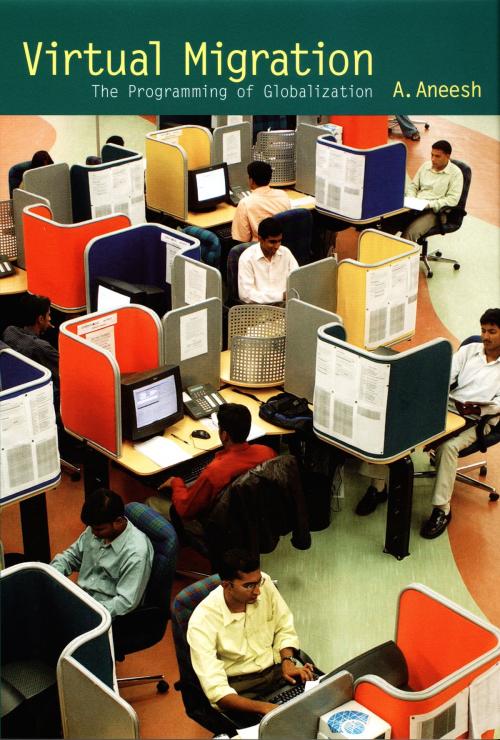Virtual Migration
The Programming of Globalization
Nonfiction, Social & Cultural Studies, Political Science, Politics, Labour & Industrial Relations| Author: | A. Aneesh | ISBN: | 9780822387534 |
| Publisher: | Duke University Press | Publication: | April 24, 2006 |
| Imprint: | Duke University Press Books | Language: | English |
| Author: | A. Aneesh |
| ISBN: | 9780822387534 |
| Publisher: | Duke University Press |
| Publication: | April 24, 2006 |
| Imprint: | Duke University Press Books |
| Language: | English |
Workers in India program software applications, transcribe medical dictation online, chase credit card debtors, and sell mobile phones, diet pills, and mortgages for companies based in other countries around the world. While their skills and labor migrate abroad, these workers remain Indian citizens, living and working in India. A. Aneesh calls this phenomenon “virtual migration,” and in this groundbreaking study he examines the emerging “transnational virtual space” where labor and vast quantities of code and data cross national boundaries, but the workers themselves do not. Through an analysis of the work of computer programmers in India working for the American software industry, Aneesh argues that the programming code connecting globally dispersed workers through data servers and computer screens is the key organizing structure behind the growing phenomenon of virtual migration. This “rule of code,” he contends, is a crucial and underexplored aspect of globalization.
Aneesh draws on the sociology of science, social theory, and research on migration to illuminate the practical and theoretical ramifications of virtual migration. He combines these insights with his extensive ethnographic research in offices in three locations in India—in Delhi, Gurgaon, and Noida—and one in New Jersey. Aneesh contrasts virtual migration with “body shopping,” the more familiar practice of physically bringing programmers from other countries to work on site, in this case, bringing them from India to New Jersey. A significant contribution to the social theory of globalization, Virtual Migration maps the expanding transnational space where globalization is enacted via computer programming code.
Workers in India program software applications, transcribe medical dictation online, chase credit card debtors, and sell mobile phones, diet pills, and mortgages for companies based in other countries around the world. While their skills and labor migrate abroad, these workers remain Indian citizens, living and working in India. A. Aneesh calls this phenomenon “virtual migration,” and in this groundbreaking study he examines the emerging “transnational virtual space” where labor and vast quantities of code and data cross national boundaries, but the workers themselves do not. Through an analysis of the work of computer programmers in India working for the American software industry, Aneesh argues that the programming code connecting globally dispersed workers through data servers and computer screens is the key organizing structure behind the growing phenomenon of virtual migration. This “rule of code,” he contends, is a crucial and underexplored aspect of globalization.
Aneesh draws on the sociology of science, social theory, and research on migration to illuminate the practical and theoretical ramifications of virtual migration. He combines these insights with his extensive ethnographic research in offices in three locations in India—in Delhi, Gurgaon, and Noida—and one in New Jersey. Aneesh contrasts virtual migration with “body shopping,” the more familiar practice of physically bringing programmers from other countries to work on site, in this case, bringing them from India to New Jersey. A significant contribution to the social theory of globalization, Virtual Migration maps the expanding transnational space where globalization is enacted via computer programming code.















